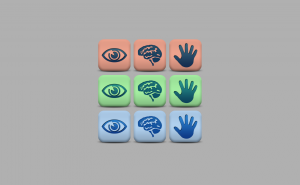I’m very picky with how I use Twitter to shape my online identity since it’s public for all to see. I use it to retweet things from my apps’ Twitter accounts and some other posts I really like, and occasionally some thoughts I have. Lately I’ve realized that your replies to people don’t show up in your main feed of tweets so I’ve been using it a bit more for communication instead of solely a platform for publishing.
The majority of my tweets are tech-related but sometimes I stray a bit. My favorite tweet of mine is an idea pertaining to the popular open source app framework PhoneGap and its lack of quality plugins.
https://twitter.com/kenfehling/status/522935097600008194
For this assignment I tweeted a link to a list of iPad music apps on Pinterest. I had already shared something similar a couple of weeks ago on Yammer but I thought this relevant for a couple of reasons.
For one thing I think some aspects of Pinterest are useful, especially the way you can share multiple aspects of your identity cleanly by creating different boards for different topics. I try to replicate this on Twitter by using multiple accounts and I wanted to highlight that here. The Twitter account for my app Color Sounds is centered around music and art technology, music apps, etc. So I planned to send the tweet from there, retweet it from my main account and post a link to that, however I don’t think you can link to a retweet.
In any case, I get the feeling I don’t use Twitter the way most people do. I’m on it a lot but almost always for consumption, hardly ever posting. I like finding interesting articles and things on it. Also I don’t think I follow or have a single follower on Twitter that’s somebody I know in real life. For me that’s what Facebook is for. Facebook is social and Twitter is business.
